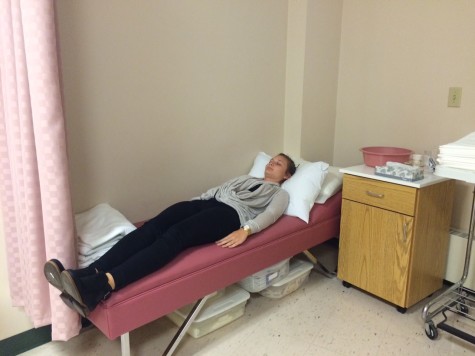Spread the Word to End the Word
October 14, 2015
During the past several decades, meningitis has become a nightmare for the healthcare industry. Meningitis is prevalent in college students and young adults. This could be contributed to a lack of knowledge and lack of awareness in teens and young adults. This point was illustrated when talking to a high school senior at Ipswich High, Michaela Hedderman. She stated, “I have heard of meningitis, but I have no idea how it affects me, and I never really thought it was so serious.” The ignorance that surrounds this deadly virus will cause the case numbers to keep growing.
While, meningitis can be very underrated, it is not something anyone should take lightly. Starting symptoms of meningitis are quite similar to the common flu that people suffer annually. Once someone contracts meningitis, symptoms can become present within twenty-four hours to several days. Not to get them confused with the flu, but early stage symptoms include sudden high fever, severe headache, vomiting or nausea and lack of interest in eating or drinking. If these symptoms are left untreated, they can become more serious and can consist of stiff neck, confusion or difficulty concentrating, seizures, sensitivity to light, and skin rashes. Symptoms should not be taken lightly; if you experience one or more of these symptoms, it’s important to get help before they turn serious.
There are several different forms of meningitis; each form can affect you differently. First, there is viral meningitis, the most common form. Viral meningitis is the least severe of the forms, but can turn fatal if not treated properly. Viral meningitis is acquired through herpes simplex virus, HIV, mumps, West Nile virus, and can go away on its own.
Secondly, there is bacterial meningitis. Bacterial meningitis is the most severe of all forms. Bacterial meningitis happens when bacteria enters through the ears, mouth or sinuses and proceeds to the bloodstream. Then it makes its way to the spinal cord and brain. At this point, the infection can be deadly if it isn’t treated quickly. When someone is diagnosed with bacterial meningitis they need antibiotics to help cure symptoms. Without antibiotics, symptoms can worsen rapidly and cause a person to have lifelong disabilities; for example, someone can experience balance problems, loss of feeling and movement in body parts, chest pain, tremors and spasms, bladder problems and lack of memory. Although bacterial meningitis is not one hundred percent preventable, there are ways to help protect yourself.
Meningitis is prevalent in young adults, especially in their college years. College students tend to be diagnosed with meningitis more often than other age groups because of their unhygienic lifestyles, including: sharing water, close encounters in dorm rooms or classrooms, kissing, and coughing. Marni, the school nurse at Ipswich High School, supports this statistical data when she states, “Meningitis is mostly spread from saliva such as shared beverages and kissing.” While students are at college, unsanitary habits become a part of their daily routines. Since these adolescents aren’t fully aware of what meningitis is, they don’t think their simple unsanitary actions can actually cause them to contract a deadly virus.
Simply changing your habits can keep you free from meningitis. In addition to your actions, there is a vaccine that helps prevent meningitis outbreaks. This vaccine is given to preteens at their eleventh or twelfth year check up and later when they are sixteen. Additionally, the vaccine is recommended for freshman in college who are moving into a dorm. When talking to sophomore Nate Hyde at Ipswich High School on his opinion of the vaccine, he said “he doesn’t believe that vaccines cover all forms of diseases, and he wouldn’t take the vaccine if given a choice because he believes he can prevent it himself.” On the other hand, Senior Michaela Hedderman said, “she would gladly take the vaccine if it helps protect herself in anyway from meningitis.” Simply by spreading the word about meningitis can help keep people safe and symptom free from a deadly virus.
The vaccine is important to take if someone has a damaged spleen, or whose spleen has been removed, persistent complement component deficiency, or been exposed to a meningitis outbreak. Although the vaccine is important to take, there are always positive and negative effects of vaccines. The vaccine can be used in ages two through fifty five and can treat four types of meningococcal disease. Side effects are very minimal; they include redness or pain at the site of the vaccination, which usually resolve within 1 or 2 days. Additionally, a fever can occur but it’s very rare. The benefits out way the side effects in the meningitis vaccine and it can be concluded that the vaccine is a good choice to help keep people safe.
In most communities today, people just assume meningitis is just another virus that won’t effect them, but they are wrong. About 600-1,000 people each year contract meningitis and of that 21% is ages 11-24. That being said, the word about meningitis needs to be spread throughout the population of all age groups, especially the young, to help reduce these numbers. If anyone ever has a doubt about whether they have meningitis or not, it is best to seek medical treatment. It’s never too late to be educated about meningitis, so please expose yourself to information to help protect yourself and others.

